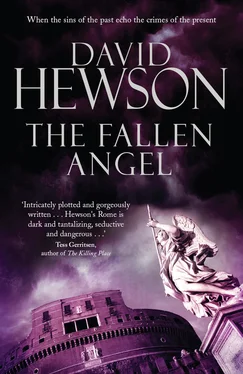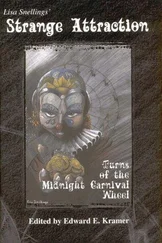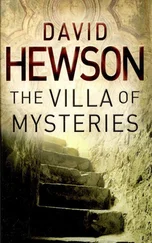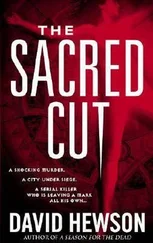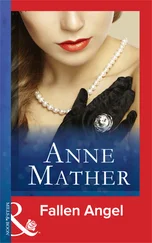David Hewson - The Fallen Angel
Здесь есть возможность читать онлайн «David Hewson - The Fallen Angel» весь текст электронной книги совершенно бесплатно (целиком полную версию без сокращений). В некоторых случаях можно слушать аудио, скачать через торрент в формате fb2 и присутствует краткое содержание. Жанр: Триллер, на английском языке. Описание произведения, (предисловие) а так же отзывы посетителей доступны на портале библиотеки ЛибКат.
- Название:The Fallen Angel
- Автор:
- Жанр:
- Год:неизвестен
- ISBN:нет данных
- Рейтинг книги:5 / 5. Голосов: 1
-
Избранное:Добавить в избранное
- Отзывы:
-
Ваша оценка:
- 100
- 1
- 2
- 3
- 4
- 5
The Fallen Angel: краткое содержание, описание и аннотация
Предлагаем к чтению аннотацию, описание, краткое содержание или предисловие (зависит от того, что написал сам автор книги «The Fallen Angel»). Если вы не нашли необходимую информацию о книге — напишите в комментариях, мы постараемся отыскать её.
The Fallen Angel — читать онлайн бесплатно полную книгу (весь текст) целиком
Ниже представлен текст книги, разбитый по страницам. Система сохранения места последней прочитанной страницы, позволяет с удобством читать онлайн бесплатно книгу «The Fallen Angel», без необходимости каждый раз заново искать на чём Вы остановились. Поставьте закладку, и сможете в любой момент перейти на страницу, на которой закончили чтение.
Интервал:
Закладка:
‘I need you to look up the personal mobile-phone number for a plain-clothes officer,’ Costa told him. ‘After that I’m going to call it and I want a trace to where he is now. Is that possible?’
Di Capua laughed.
‘Are you serious? This is kindergarten stuff. Beneath me. Let me put you over to my new friend, Maria. She can handle it.’
Costa remembered the accident with the camera and the rumour that the same girl had seen Malise Gabriel’s corpse at the weekend and noticed nothing untoward.
‘You mean the Maria who. .?’
He didn’t have time to finish the sentence. A bubbly young woman was on the line asking a series of detailed questions. Costa steeled himself. She seemed to know what she was doing.
It took a minute to get Riggi’s number, then another three to set up the trace. Costa sent up a little prayer that the bent narcotics cop wasn’t on voicemail then walked back round the corner, stood next to the pretty girls outside the bar, and dialled, withholding his own number.
After four rings a bad-tempered male voice barked, ‘ Pronto .’
‘Hey, Sergio!’ Costa said in a loud, crude voice. ‘Where the hell you been? We’re waiting for you. At the bar. The girls are here and they look gorgeous. Girls? Say hello to Sergio!’
The giggly kids had been listening. They raised their mojito glasses and yelled, ‘Sergio!’
‘I can’t believe you’re late again, you idle jerk,’ Costa said. ‘You got your head on right?’
‘What’re you talking about, moron?’ Riggi yelled. ‘I’m not Sergio. Check the damned number next time.’
Then silence. Costa smiled at the girls and shrugged. He walked back round the corner and waited. It was Silvio Di Capua who called back.
‘If you tell me your new girlfriend screwed that up,’ Costa told him, ‘my reputation for possessing a forgiving nature will be sorely tested.’
‘New girlfriend. I wish. Maria’s one smart kid. You just have to keep her away from touching things. Physical stuff. Anything breakable.’
‘That doesn’t bode well for a developing relationship. Where was the call from?’
He listened. It was a rough fix, based on the mobile network’s cell. But if he married it up with Rosa’s knowledge. .
Costa walked back into the bar and pulled her away from a couple of loud and bleary-eyed Australians.
‘Do you mind?’ she said, dragging his hand off her bare arm. ‘I might have been getting somewhere there.’
‘Were you?’
‘I said might have been.’
‘Trastevere. The names of the bars Riggi frequents.’
She looked puzzled but rattled off the ones she knew.
Di Capua said the call came from somewhere near the Piazza Trilussa, the tiny little square on the other side of the Ponte Sisto, the pedestrian bridge that ran across the river from close to the Palazzetto Santacroce. There was one obvious dive on her list. It was a long walk.
He went over to the coat stand in the corner and picked up the helmets he’d left there, thrusting the spare into Rosa Prabakaran’s hands.
‘What the hell’s going on, Nic?’ she demanded.
‘You said we’d look good on the Vespa,’ he told her.
FOUR
Kids, Riggi thought. You had to use them. No one else was stupid enough to do the job. But dealing with their idiocy, their unpredictability, their flakiness — these things drove him crazy sometimes.
He sat on a stool outside the bar in the back street near the Piazza Trilussa watching the streams of brightly clad adolescents wandering into the centre of Trastevere for the evening. A long night usually, one that might not end till three or later, till daylight, when some would find themselves on a bench by the Tiber, exhausted yet popped up with chemicals, munching cheap pizza, wondering what came next.
Riggi’s uncle had lived in Trastevere. When the cop first came to Rome from Venice he’d lived with the old man for a while, in a narrow, winding street that ran up the Gianicolo hill, all the way to the church of Montorio and beyond, towards the piazzale dedicated to Garibaldi. This was only eight or nine years ago, but it seemed a lifetime away. So much had happened since, in Riggi’s life, in that of Trastevere. His uncle had sold his little house for a fortune to some banker in Chicago who’d sliced it into apartments that he now rented over the Internet to tourists. Most of the neighbours had done the same so the streets that once were alive with Romans now had an anonymous, shifting population, without ties, without history.
When Riggi first came to Rome his uncle had proudly told him how Trastevere was the last true neighbourhood in the centre of the city. A solid, tightly knit community of families, most of whom had been staking their claim to these tapering streets of modest, cramped houses for centuries. Now many of the locals had taken the tourist dollar, moved out to new apartment blocks built on the flat estuarial land near Fiumicino. Places that came with easy parking and supermarkets nearby, fast trains back into the city for those who needed them. All the conveniences of modern life.
And Trastevere was slowly transformed, the Roman elements of it mutating into museum pieces for the crowds of wandering foreign tourists, the houses sold on for sums of money that men like his uncle, a dignified but impoverished print worker, could never have dreamed of attaining through their daily labour.
He hated the place. He loved it too. The kids here, gullible youngsters like Robert Gabriel, were his to control, to use, to master.
Riggi sipped his beer and thought of the ones he’d dealt with over the years. Most, in the early days, had wound up in court, busted for small amounts of dope, silent, always, about where the stuff came from. Two weeks later they’d be back in the bars, their tiny fortunes stored in plastic bags and rolled-up balls of foil. He hadn’t changed a thing by arresting them. It was like brushing away the flood water back home in Venice. The acqua alta always returned. Why? Because this was where, when the season chose, it belonged.
So he came to the conclusion it might be easier to win their confidence, to let them think he was as crooked as they were, given the opportunity. This way he got to glimpse the men behind them, the shadowy, dark figures who lived far away in pleasant suburbs, with wives and children at expensive private schools, all paid for by a pricey pinch of chemical that went into some foreigner’s nostril or mouth or vein late on a Trastevere night.
At some unnoticed point over the years the dividing line between him and them had disappeared altogether. Why? He’d no idea. He couldn’t even pinpoint the moment, the event, at which the change had occurred. Sometimes the acqua alta turned up on schedule. Sometimes it never showed. That was the way of things.
How many bar kids pushing dope had he met this way over the years? Forty. Fifty. More. He’d lost count. Most of them looked the same anyway. Lanky, tall, pale, with unkempt hair and blank, dead faces. From time to time one of them would fail the exam, the subtle, short interview Riggi gave them before revealing who he truly was. And then they’d wind up in front of a magistrate, serving a little time, always in silence. The Vadisi understood the need for this. A cop who never caught anyone would soon attract suspicion. Statistics mattered, more and more. He needed sacrifices, just as much as the Turks did. They were necessary for all the old reasons, and practicality meant that it was easier to put the innocent and the gullible to the sword than the guilty. This was a world constantly on the edge of breaking. An occasional scapegoat, some dumb youngster putting up his hand to selling coke and heroin and poppers, kept the lid on, for a while anyway.
Читать дальшеИнтервал:
Закладка:
Похожие книги на «The Fallen Angel»
Представляем Вашему вниманию похожие книги на «The Fallen Angel» списком для выбора. Мы отобрали схожую по названию и смыслу литературу в надежде предоставить читателям больше вариантов отыскать новые, интересные, ещё непрочитанные произведения.
Обсуждение, отзывы о книге «The Fallen Angel» и просто собственные мнения читателей. Оставьте ваши комментарии, напишите, что Вы думаете о произведении, его смысле или главных героях. Укажите что конкретно понравилось, а что нет, и почему Вы так считаете.
